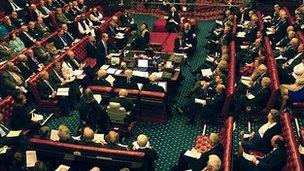Lords reform: Coalition suffers biggest rebellion
- Published
- comments

The coalition is at loggerheads over plans to elect 80% of members of the House of Lords
The coalition has suffered its biggest rebellion since it came to power after 91 Conservative MPs opposed plans for a mainly elected House of Lords.
The government still won the vote on the principle of its proposed reforms to Parliament with a majority of 338.
Nick Clegg called it a "huge triumph", but it came after ministers had ditched a vote to limit time for debating the bill amid signs they would be defeated.
Nick Clegg: "A coalition is like a contract...a deal is a deal"
Lib Dems warned of "consequences" if the Tories failed to back the bill.
Deputy leader Simon Hughes told the BBC that if the Conservatives failed to deliver on this part of the coalition deal, the Lib Dems might not back plans to reform constituency boundaries, "which is advantageous to them".
'Matter of regret'
The key moment of Tuesday's events was the decision of the government to drop the vote on a "programme motion" - which would have set out a timetable for the Lords Reform Bill to get through the Commons.
Labour had planned to join Conservative rebels in opposing that timetabling motion, saying 10 scheduled days of debate was not enough to give proper scrutiny of the reform proposals - which are for a much smaller, 80% elected Lords.
Ministers say they now plan to ask MPs to vote on the timetabling of the bill - regarded as crucial if it is to get through Parliament without being talked out by opponents - in the autumn.
In the vote on the principle of the Lords reform plans, Labour supported the government with the second reading passing by 462 votes to 124, although 26 Labour MPs joined the rebel Conservatives in defying their party leader to vote against.
The vote enables the legislation to move to the next stage of its parliamentary passage.
But the fallout of the vote on the coalition and on party leaders is the focus of attention on Wednesday.
The number of Tory rebels exceeded the 81 who defied the government over an EU referendum last year and included one ministerial aide, Angie Bray, who has been sacked, and another, Conor Burns, who had resigned earlier.
They also included Graham Brady, chairman of the party's influential 1922 backbench committee, former ministers Sir Malcolm Rifkind, David Davis and Peter Lilley and many MPs elected for the first time in 2010.
'Chain reaction'
Sir Malcolm told BBC Radio 5 live Breakfast he would not rule out getting the bill through parliament by 2015, but said it would be "very difficult" and it would probably have to take a different form.
Tory Education Secretary Michael Gove told BBC Two's Newsnight: "Of course it is a matter of regret to me when I see Conservative colleagues - friends - in a different voting lobby to me."
But he said it had been a "good night" for those who believed in House of Lords reform, adding: "We have had the biggest vote in favour of House of Lords reform ever.
"There is now a task for me and for others who believe in reform to persuade our colleagues."
There were also reports of an angry confrontation between Mr Cameron and one of the highest profile of the 2010 election intake of Conservative MPs - Jesse Norman - after he rebelled.
In an email to Liberal Democrat activists, Mr Clegg said: "This is a huge triumph for our party, and a clear mandate to deliver much needed reforms to the House of Lords.
"We have been reasonable and looked at acceptable compromises at every stage. That is why we agreed to withdraw today's timetabling motion, to allow the Conservative team in government take more time over the summer to talk to their backbench colleagues."
But the deputy prime minister added: "When we return in the autumn to vote on this again, we fully expect the Conservatives to deliver this crucial part of the coalition deal - as we have delivered other coalition policies."
Michael Gove: "We have had the biggest vote in favour of House of Lords reform ever"
BBC political editor Nick Robinson said the Lib Dems were refusing to accept defeat and were making clear there would be a "heavy price" for the Conservatives if they failed to pursue the case for reform - included in all three parties election manifestos in 2010.
Lib Dem MP David Laws said wrangling over House of Lords reform could lead to a "chain reaction" which threatened the rest of the coalition's programme. The coalition could be less "productive" in other areas if its partners decided to "pick and choose" which policies they would support, he warned.
But a succession of Conservative backbenchers have suggested the proposed legislation on the composition of the Lords should be ditched altogether as the government risked undermining its authority if it proceeded further.
Ms Bray said the government needed to completely rethink its approach and try to build a consensus behind its proposals.
"I believe this bill is basically dead," she told the BBC. "There is no desire for it."
- Published11 July 2012
- Published11 July 2012
- Published10 July 2012
- Published6 August 2012
- Published10 July 2012
- Published11 July 2012